人教版必修五Unit1Great scientistsPeriod1 Reading课件(49张)
文档属性
| 名称 | 人教版必修五Unit1Great scientistsPeriod1 Reading课件(49张) | 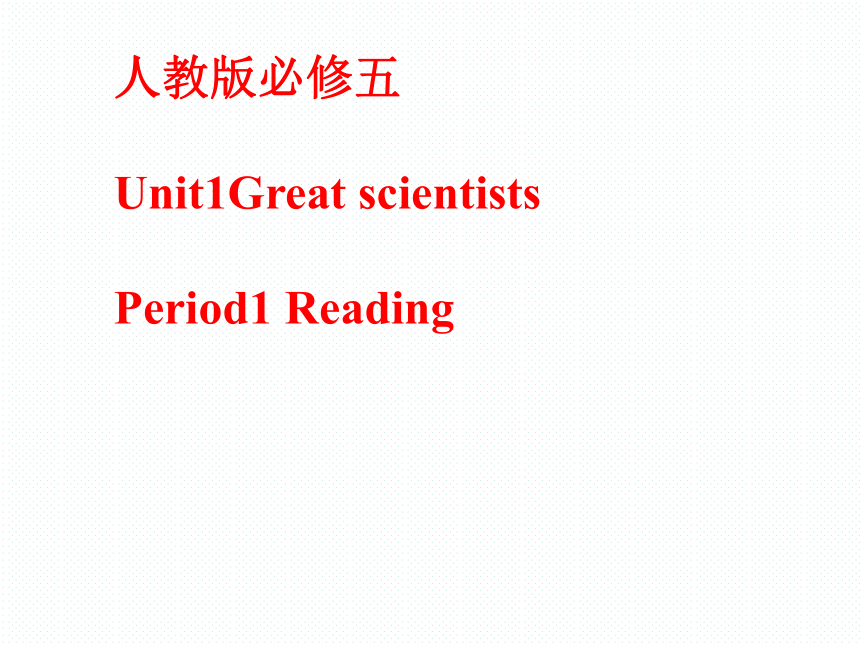 | |
| 格式 | ppt | ||
| 文件大小 | 2.7MB | ||
| 资源类型 | 教案 | ||
| 版本资源 | 人教版(新课程标准) | ||
| 科目 | 英语 | ||
| 更新时间 | 2020-12-01 09:04:25 | ||
图片预览

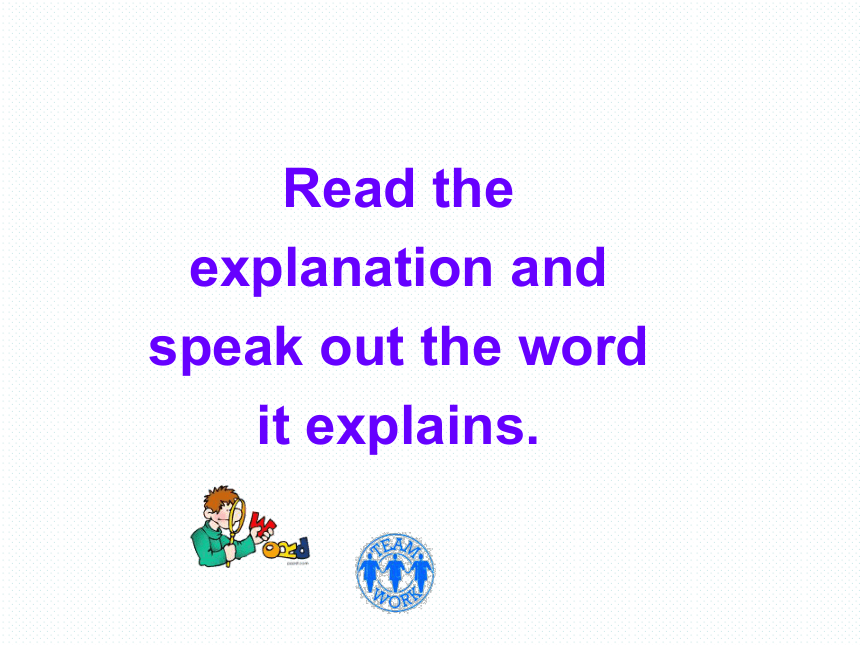
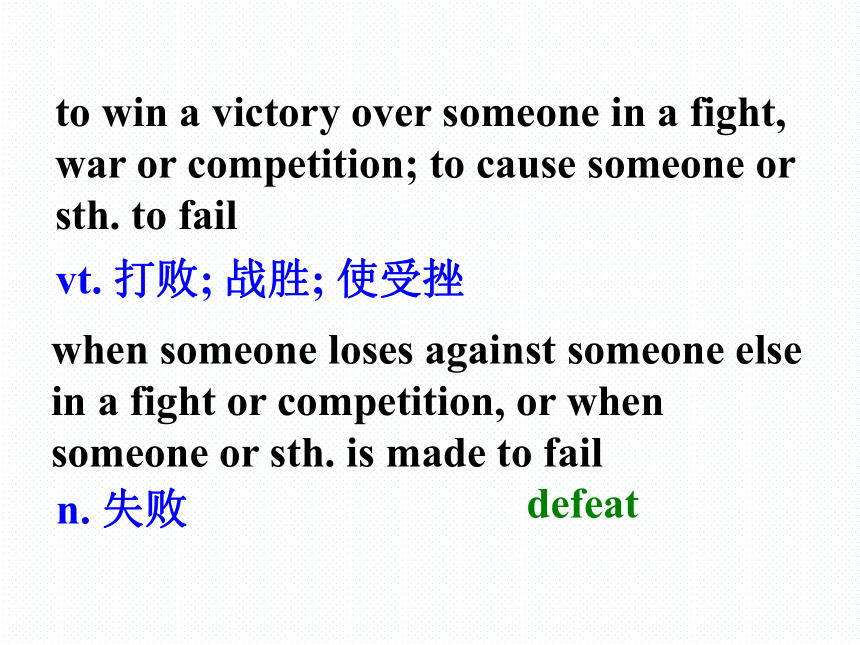
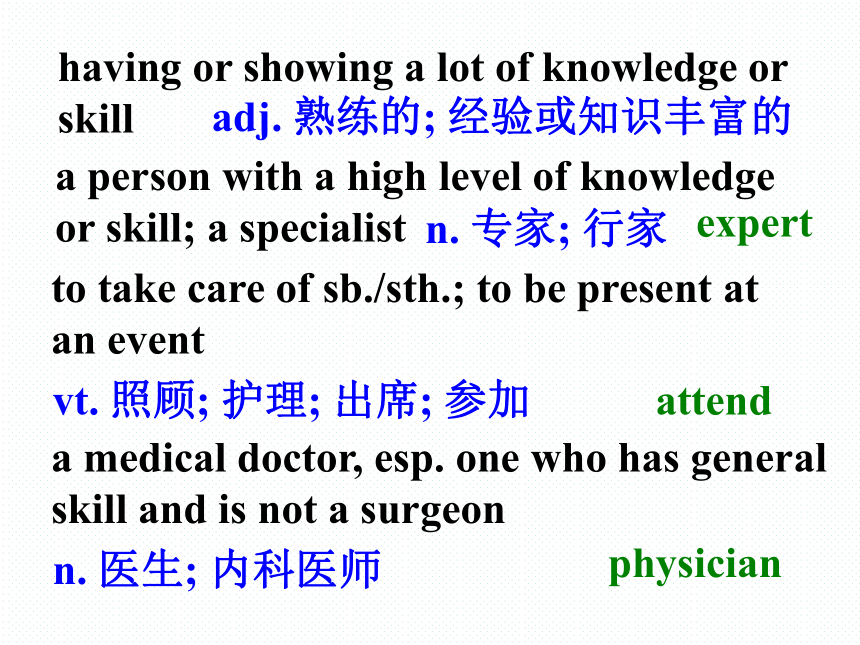
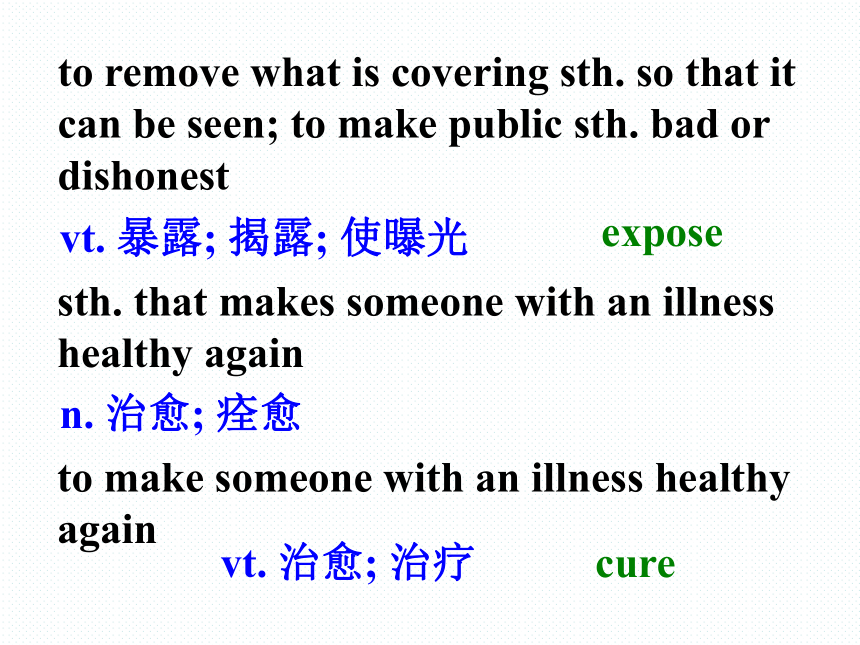
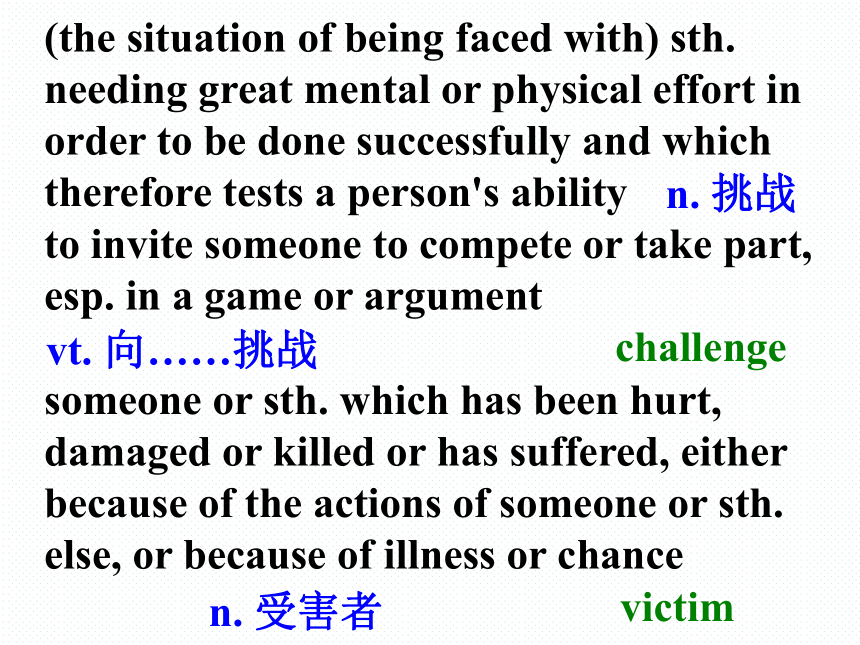
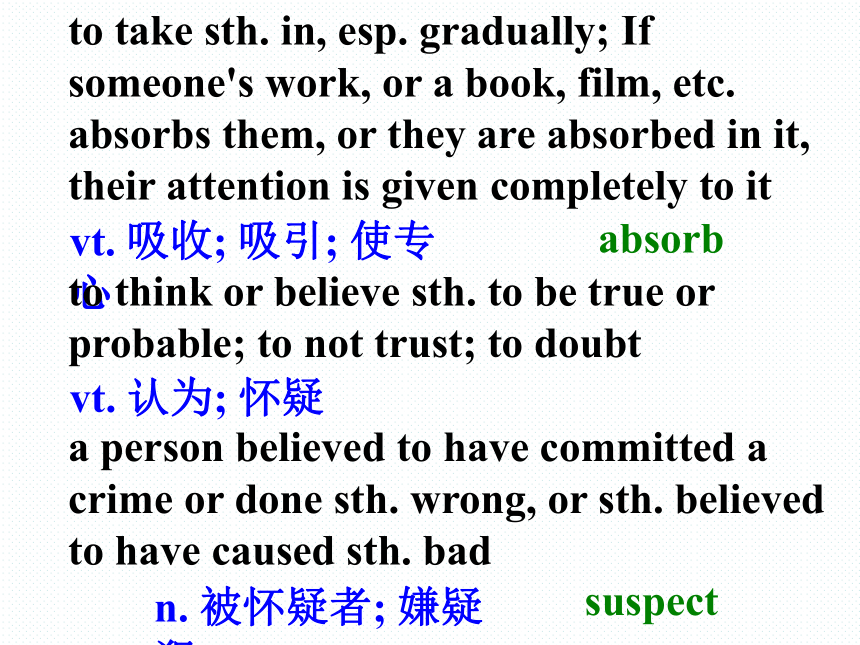
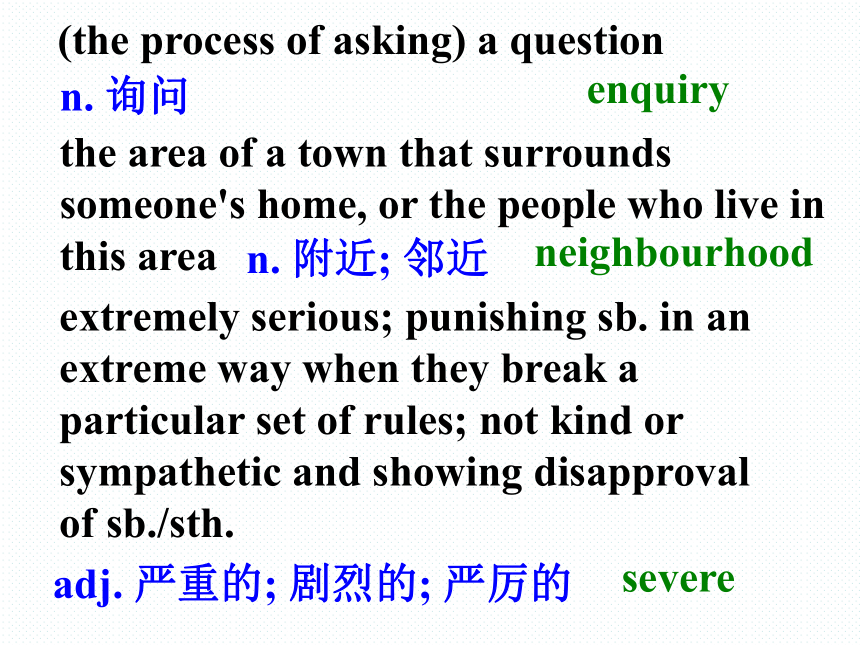
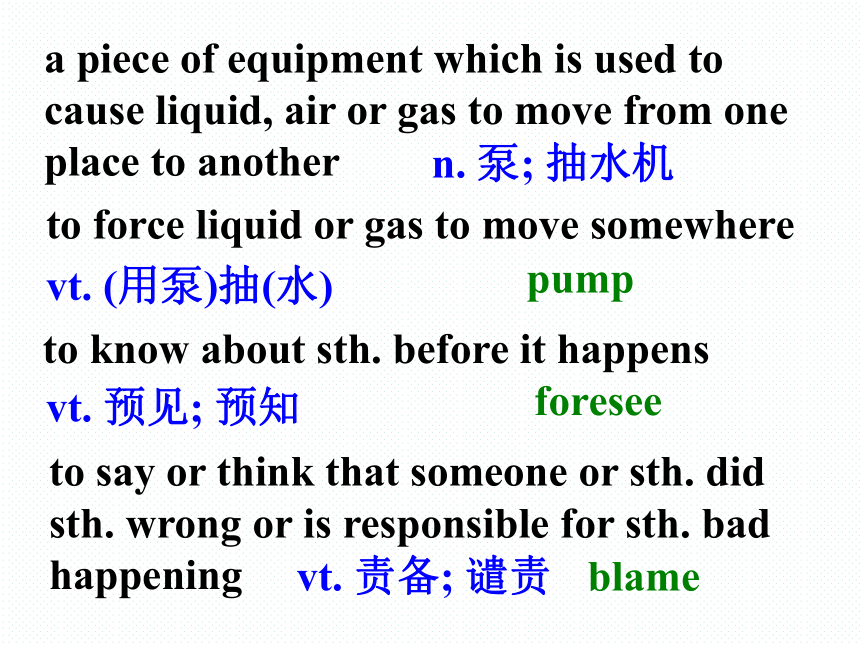
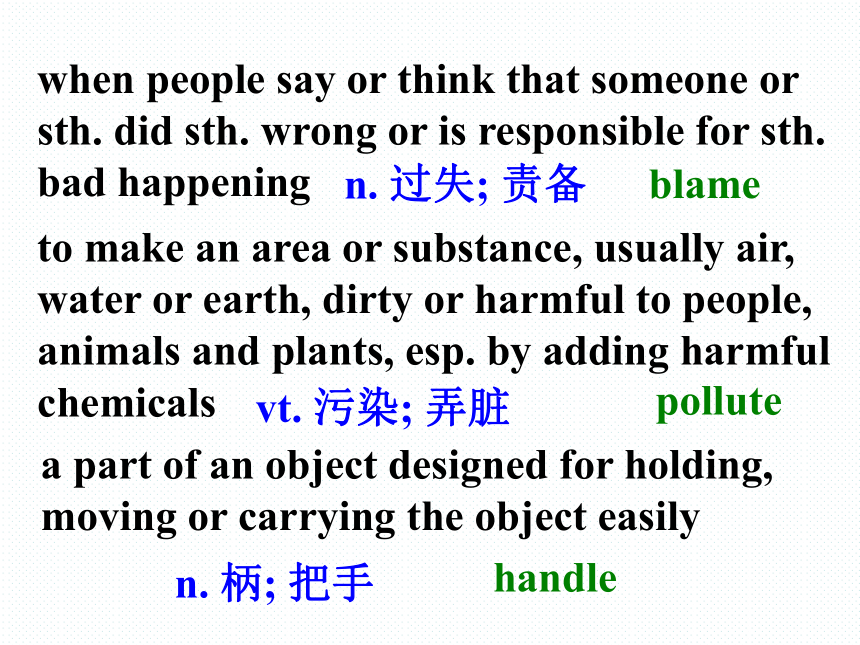
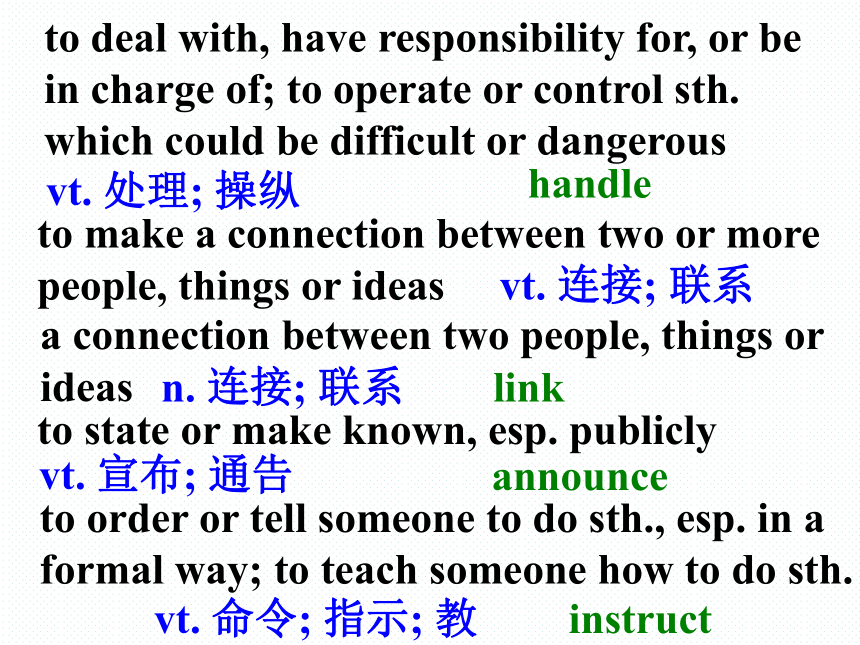

文档简介
人教版必修五
Unit1Great scientists
Period1 Reading
Read the explanation and speak out the word it explains.
vt. 打败; 战胜; 使受挫
n. 失败
defeat
to win a victory over someone in a fight, war or competition; to cause someone or sth. to fail
when someone loses against someone else in a fight or competition, or when someone or sth. is made to fail
to take care of sb./sth.; to be present at an event
n. 专家; 行家
vt. 照顾; 护理; 出席; 参加
attend
a person with a high level of knowledge or skill; a specialist
expert
n. 医生; 内科医师
a medical doctor, esp. one who has general skill and is not a surgeon
physician
having or showing a lot of knowledge or skill
adj. 熟练的; 经验或知识丰富的
to make someone with an illness healthy again
vt. 暴露; 揭露; 使曝光
n. 治愈; 痊愈
expose
cure
to remove what is covering sth. so that it can be seen; to make public sth. bad or dishonest
vt. 治愈; 治疗
sth. that makes someone with an illness healthy again
(the situation of being faced with) sth. needing great mental or physical effort in order to be done successfully and which therefore tests a person's ability
n. 挑战
n. 受害者
victim
challenge
vt. 向……挑战
to invite someone to compete or take part, esp. in a game or argument
someone or sth. which has been hurt, damaged or killed or has suffered, either because of the actions of someone or sth. else, or because of illness or chance
vt. 认为; 怀疑
suspect
n. 被怀疑者; 嫌疑犯
absorb
vt. 吸收; 吸引; 使专心
to take sth. in, esp. gradually; If someone's work, or a book, film, etc. absorbs them, or they are absorbed in it, their attention is given completely to it
to think or believe sth. to be true or probable; to not trust; to doubt
a person believed to have committed a crime or done sth. wrong, or sth. believed to have caused sth. bad
the area of a town that surrounds someone's home, or the people who live in this area
adj. 严重的; 剧烈的; 严厉的
severe
neighbourhood
n. 附近; 邻近
n. 询问
enquiry
(the process of asking) a question
extremely serious; punishing sb. in an extreme way when they break a particular set of rules; not kind or sympathetic and showing disapproval of sb./sth.
a piece of equipment which is used to cause liquid, air or gas to move from one place to another
n. 泵; 抽水机
pump
foresee
vt. 预见; 预知
vt. (用泵)抽(水)
to force liquid or gas to move somewhere
to know about sth. before it happens
to say or think that someone or sth. did sth. wrong or is responsible for sth. bad happening
vt. 责备; 谴责
blame
when people say or think that someone or sth. did sth. wrong or is responsible for sth. bad happening
to make an area or substance, usually air, water or earth, dirty or harmful to people, animals and plants, esp. by adding harmful chemicals
vt. 污染; 弄脏
pollute
blame
n. 柄; 把手
n. 过失; 责备
a part of an object designed for holding, moving or carrying the object easily
handle
a connection between two people, things or ideas
to make a connection between two or more people, things or ideas
vt. 连接; 联系
vt. 宣布; 通告
announce
instruct
link
vt. 命令; 指示; 教导
n. 连接; 联系
to deal with, have responsibility for, or be in charge of; to operate or control sth. which could be difficult or dangerous
handle
vt. 处理; 操纵
to state or make known, esp. publicly
to order or tell someone to do sth., esp. in a formal way; to teach someone how to do sth.
expose … to
link … to …
将……和……联系或连接起来
由……组成
使显露; 暴露
Match
JOHN SNOW DEFEATS
“KING CHOLERA”
Reading
1. To summarize and remember the
main idea of the passage.
2. To speak out the detailed information
of the passage.
3. To know more about John Snow and
his achievements.
4. To learn some useful words and
expressions in the passage.
Objectives
Words:
defeat, attend, cure, challenge, suspect, blame, pollute, handle, link, announce
Expressions:
expose … to,
link … to …
neither … nor …
be/become interested in
be determined to
Reading Tips
阅读时,可根据阅读任务的不同,综合运用略读(skimming)与扫读(scanning) 。提高快速阅读水平。
Skimming and scanning
Skimming and scanning are two fast reading skills to help to browse text and extract the key points.
The skills require practice, but once you have got the hang of them you’ll find you can get through a substantial amount of reading in quite a short time.
These reading methods make it easier for you to grasp large amounts of material, especially when you're previewing. They are also useful when you don't need to know every word.
略读(skimming)只看文章标题、下标题以及每个部分或者段落第一行,关注文章中反复出现的关键词。
略读时,要用充足的时间读懂段落的第一句和第二句,因为第一句往往是该段的主题句(topic sentence),而第二句往往是对前句的延伸(extension)或进一步的解释(explanation)。
通过略读把握文章大意
运用扫读(scanning)迅速浏览从第三句开始的后面部分,搜寻作者对开头两句的支持句(supporting sentences),并同时注意文章中间是否有转折词(transition),因为这些词常常会把文章的思路逆转或加入其它重要的信息。当读到段落的最后一句时,我们又要使用略读,这时必须再次放慢速度(slow down your pace)直到完全消化作者对段落的小结(conclusion),因为该小结有可能与主题句截然相反或引导读者进入下一个段落。
通过扫读寻找特定信息或特定词组
a general
idea
certain
information
titles and headings
the first and last
sentences of paragraphs
the first and last paragraphs
pictures and charts
Scan the text for
key words and phrases, dates, etc.
Do not need to
read the whole
text.
Skimming for general idea
After reading the passage,
match the following stages
with the paragraphs.
Reading Comprehension I
Skimming
Stages
Draw a conclusion
Think of a method
Collect results
Make a question
Find a problem
Analyze the results
Find supporting evidence
Para.
Stages in an experiment
1
2
3
4
5
6
7
Find a problem
Make a question
Think of a method
Collect results
Analyse the results
Draw a conclusion
Find supporting evidence
Paragraphs & Stages
First we should find the problem.
Then, think of a method. We should
collect as much information as possible.
Analyzing results is the most
important stage.
Before we make a conclusion, it is
necessary for us to find supporting
evidence.
Summary
What’s the main idea of the passage?
A. John Snow was a well-known doctor
in London.
B. The cause of cholera was polluted water.
C. The source of all drinking water should
be examined.
D. How John Snow collected, analysed
data and found the cause of the disease
and defeated the disease.
Reading Comprehension II
Skimming
Reading Comprehension III
Skimming
Read the passage to find the main idea of each paragraph.
John Snow wanted to use his
knowledge to solve cholera.
He got interested in two theories.
He needed to prove the second
theory was correct.
He found out that dirty water was
the cause of cholera.
Para. 1
Para. 2
Para. 3
Para. 4
Para. 6
Para. 7
Polluted water carried the virus.
Finally “King Cholera” was defeated.
Para. 5
Cholera was spread by germs and
not in a cloud of gas.
Scanning for specific information
Read the passage and number these
events in the order that they happened.
___ John Snow began to test two theories.
___ An outbreak of cholera hit London in
1854.
___ John Snow marked the deaths on a
map.
Reading Comprehension IV
Scanning
___ He announced that the water carried
the disease.
___ John Snow investigated two streets
where the outbreak was very severe.
___ King Cholera was defeated.
___ He found that most of the deaths were
near a water pump.
___ He had the handle removed from the
water pump.
Answer: 2 1 4 7 3 8 5 6
Reading Comprehension V
Why couldn’t the cholera be controlled
at first?
A. Its speed of spreading was so fast.
B. Its cause wasn’t understood
C. Its cure wasn’t understood.
D. Both B. & C.
Scanning
2. How many people died in 10 days
in two particular streets?
A. Less than 500.
B. More than 500.
C. More than 450.
D. Less than 450.
3. What attitude did John Snow take to
the two supposed theories explaining
how cholera attacked people?
A. Doubtful but he could do nothing
about it.
B. Objective and he asked his assistants
to gather information.
C. Acceptable and he was sure about
the causes.
D. Reasonable but they remained to be
proved scientifically.
1 John Snow believed Idea 2 was right. How did he finally prove it?
John Snow finally proved his idea
because he found an outbreak that was
clearly related to cholera, collected
information and was able to tie cases
outside the area to the polluted water.
Reading Comprehension VI
Answer these questions.
Scanning
2 Do you think John Snow would have
solved this problem without the map?
Give a reason.
No. The map helped John Snow organize
his ideas. He was able to identify those
households that had had many deaths
and check their water-drinking habits.
He identified those houses that had had
no deaths and surveyed their drinking
habits. The evidence clearly pointed to
the polluted water being the cause.
3 Cholera was a 19th century disease. What disease do you think is similar to cholera today? Why?
Three diseases, which are similar today,
are SARS, AIDS and bird flu, because
they are serious, have an unknown
cause and need public health care to
solve them.
Discuss the question in groups.
Group Work
What should you do if you're travelling to a country that has a cholera outbreak?
Drink only water that you have boiled.
Other safe drinks include tea or coffee
made with boiled water, bottled
beverages with no ice.
Discussion
Eat only food that's been thoroughly cooked and is still hot, or fruit that you've peeled yourself.
Avoid undercooked or raw fish and shellfish.
Avoid raw salads and vegetables.
Avoid food and drinks from street vendors.
TIPS
Individual activity
John Snow was a well-known ______ in London in the ____ century. He wanted
to find the ______ of cholera in order to ______ it. In 1854 when a cholera ______ out, he began to gather information. He _______ on a map where all the dead people had lived and he found that many
doctor
19th
cause
defeat
broke
marked
I. Retell the text by filling in
the following blanks.
注: 另附 word 文档。
点击此处链接
people who had _______ the dirty water
from the ______ died. So he decided that the polluted water carried the virus. He suggested that the _______ of all the water supplies be _________. The water companies were _________ not to expose people to polluted water any more. Finally, “King Cholera” was defeated.
pump
source
examined
instructed
drunk
II. Task-based reading.
注: 另附 word 文档。
点击此处链接
Put the following steps of scientific research in correct order according to the passage.
Put forward a hypothesis
Analyze your data and draw a conclusion
Ask a question
Test your hypothesis by doing experiments
Do background research
The steps of the scientific research:
1. _______________________________→
2. _______________________________→
3. _______________________________→
4. _______________________________
_______________________________→
5. _______________________________
_______________________________
Ask a question
Do background research
Put forward a hypothesis
Test your hypothesis by doing experiments
Analyze your data and draw a conclusion
Things I can do
Evaluation
I can talk about some great scientists.
5
4
3
2
1
I can understand the reading passage.
5
4
3
2
1
I can express my opinion on how cholera was defeated.
5
4
3
2
1
I can understand and spell the new words and expressions and can use them in new situation.
5
4
3
2
1
I can understand the sentence patterns and write new sentences with them.
5
4
3
2
1
I need more practice in _________________________.
Think about what we’ve just learnt today.
Study without reflection is a waste of time.
After the class
It’s time to stop the class for you to look back in silence.
Find more information about John Snow and cholera.
expert, physician, absorb, enquiry, severe, foresee, pollute, link … to …, announce, instruct.
2. 发挥想象,连词成文(50-100字)。
Unit1Great scientists
Period1 Reading
Read the explanation and speak out the word it explains.
vt. 打败; 战胜; 使受挫
n. 失败
defeat
to win a victory over someone in a fight, war or competition; to cause someone or sth. to fail
when someone loses against someone else in a fight or competition, or when someone or sth. is made to fail
to take care of sb./sth.; to be present at an event
n. 专家; 行家
vt. 照顾; 护理; 出席; 参加
attend
a person with a high level of knowledge or skill; a specialist
expert
n. 医生; 内科医师
a medical doctor, esp. one who has general skill and is not a surgeon
physician
having or showing a lot of knowledge or skill
adj. 熟练的; 经验或知识丰富的
to make someone with an illness healthy again
vt. 暴露; 揭露; 使曝光
n. 治愈; 痊愈
expose
cure
to remove what is covering sth. so that it can be seen; to make public sth. bad or dishonest
vt. 治愈; 治疗
sth. that makes someone with an illness healthy again
(the situation of being faced with) sth. needing great mental or physical effort in order to be done successfully and which therefore tests a person's ability
n. 挑战
n. 受害者
victim
challenge
vt. 向……挑战
to invite someone to compete or take part, esp. in a game or argument
someone or sth. which has been hurt, damaged or killed or has suffered, either because of the actions of someone or sth. else, or because of illness or chance
vt. 认为; 怀疑
suspect
n. 被怀疑者; 嫌疑犯
absorb
vt. 吸收; 吸引; 使专心
to take sth. in, esp. gradually; If someone's work, or a book, film, etc. absorbs them, or they are absorbed in it, their attention is given completely to it
to think or believe sth. to be true or probable; to not trust; to doubt
a person believed to have committed a crime or done sth. wrong, or sth. believed to have caused sth. bad
the area of a town that surrounds someone's home, or the people who live in this area
adj. 严重的; 剧烈的; 严厉的
severe
neighbourhood
n. 附近; 邻近
n. 询问
enquiry
(the process of asking) a question
extremely serious; punishing sb. in an extreme way when they break a particular set of rules; not kind or sympathetic and showing disapproval of sb./sth.
a piece of equipment which is used to cause liquid, air or gas to move from one place to another
n. 泵; 抽水机
pump
foresee
vt. 预见; 预知
vt. (用泵)抽(水)
to force liquid or gas to move somewhere
to know about sth. before it happens
to say or think that someone or sth. did sth. wrong or is responsible for sth. bad happening
vt. 责备; 谴责
blame
when people say or think that someone or sth. did sth. wrong or is responsible for sth. bad happening
to make an area or substance, usually air, water or earth, dirty or harmful to people, animals and plants, esp. by adding harmful chemicals
vt. 污染; 弄脏
pollute
blame
n. 柄; 把手
n. 过失; 责备
a part of an object designed for holding, moving or carrying the object easily
handle
a connection between two people, things or ideas
to make a connection between two or more people, things or ideas
vt. 连接; 联系
vt. 宣布; 通告
announce
instruct
link
vt. 命令; 指示; 教导
n. 连接; 联系
to deal with, have responsibility for, or be in charge of; to operate or control sth. which could be difficult or dangerous
handle
vt. 处理; 操纵
to state or make known, esp. publicly
to order or tell someone to do sth., esp. in a formal way; to teach someone how to do sth.
expose … to
link … to …
将……和……联系或连接起来
由……组成
使显露; 暴露
Match
JOHN SNOW DEFEATS
“KING CHOLERA”
Reading
1. To summarize and remember the
main idea of the passage.
2. To speak out the detailed information
of the passage.
3. To know more about John Snow and
his achievements.
4. To learn some useful words and
expressions in the passage.
Objectives
Words:
defeat, attend, cure, challenge, suspect, blame, pollute, handle, link, announce
Expressions:
expose … to,
link … to …
neither … nor …
be/become interested in
be determined to
Reading Tips
阅读时,可根据阅读任务的不同,综合运用略读(skimming)与扫读(scanning) 。提高快速阅读水平。
Skimming and scanning
Skimming and scanning are two fast reading skills to help to browse text and extract the key points.
The skills require practice, but once you have got the hang of them you’ll find you can get through a substantial amount of reading in quite a short time.
These reading methods make it easier for you to grasp large amounts of material, especially when you're previewing. They are also useful when you don't need to know every word.
略读(skimming)只看文章标题、下标题以及每个部分或者段落第一行,关注文章中反复出现的关键词。
略读时,要用充足的时间读懂段落的第一句和第二句,因为第一句往往是该段的主题句(topic sentence),而第二句往往是对前句的延伸(extension)或进一步的解释(explanation)。
通过略读把握文章大意
运用扫读(scanning)迅速浏览从第三句开始的后面部分,搜寻作者对开头两句的支持句(supporting sentences),并同时注意文章中间是否有转折词(transition),因为这些词常常会把文章的思路逆转或加入其它重要的信息。当读到段落的最后一句时,我们又要使用略读,这时必须再次放慢速度(slow down your pace)直到完全消化作者对段落的小结(conclusion),因为该小结有可能与主题句截然相反或引导读者进入下一个段落。
通过扫读寻找特定信息或特定词组
a general
idea
certain
information
titles and headings
the first and last
sentences of paragraphs
the first and last paragraphs
pictures and charts
Scan the text for
key words and phrases, dates, etc.
Do not need to
read the whole
text.
Skimming for general idea
After reading the passage,
match the following stages
with the paragraphs.
Reading Comprehension I
Skimming
Stages
Draw a conclusion
Think of a method
Collect results
Make a question
Find a problem
Analyze the results
Find supporting evidence
Para.
Stages in an experiment
1
2
3
4
5
6
7
Find a problem
Make a question
Think of a method
Collect results
Analyse the results
Draw a conclusion
Find supporting evidence
Paragraphs & Stages
First we should find the problem.
Then, think of a method. We should
collect as much information as possible.
Analyzing results is the most
important stage.
Before we make a conclusion, it is
necessary for us to find supporting
evidence.
Summary
What’s the main idea of the passage?
A. John Snow was a well-known doctor
in London.
B. The cause of cholera was polluted water.
C. The source of all drinking water should
be examined.
D. How John Snow collected, analysed
data and found the cause of the disease
and defeated the disease.
Reading Comprehension II
Skimming
Reading Comprehension III
Skimming
Read the passage to find the main idea of each paragraph.
John Snow wanted to use his
knowledge to solve cholera.
He got interested in two theories.
He needed to prove the second
theory was correct.
He found out that dirty water was
the cause of cholera.
Para. 1
Para. 2
Para. 3
Para. 4
Para. 6
Para. 7
Polluted water carried the virus.
Finally “King Cholera” was defeated.
Para. 5
Cholera was spread by germs and
not in a cloud of gas.
Scanning for specific information
Read the passage and number these
events in the order that they happened.
___ John Snow began to test two theories.
___ An outbreak of cholera hit London in
1854.
___ John Snow marked the deaths on a
map.
Reading Comprehension IV
Scanning
___ He announced that the water carried
the disease.
___ John Snow investigated two streets
where the outbreak was very severe.
___ King Cholera was defeated.
___ He found that most of the deaths were
near a water pump.
___ He had the handle removed from the
water pump.
Answer: 2 1 4 7 3 8 5 6
Reading Comprehension V
Why couldn’t the cholera be controlled
at first?
A. Its speed of spreading was so fast.
B. Its cause wasn’t understood
C. Its cure wasn’t understood.
D. Both B. & C.
Scanning
2. How many people died in 10 days
in two particular streets?
A. Less than 500.
B. More than 500.
C. More than 450.
D. Less than 450.
3. What attitude did John Snow take to
the two supposed theories explaining
how cholera attacked people?
A. Doubtful but he could do nothing
about it.
B. Objective and he asked his assistants
to gather information.
C. Acceptable and he was sure about
the causes.
D. Reasonable but they remained to be
proved scientifically.
1 John Snow believed Idea 2 was right. How did he finally prove it?
John Snow finally proved his idea
because he found an outbreak that was
clearly related to cholera, collected
information and was able to tie cases
outside the area to the polluted water.
Reading Comprehension VI
Answer these questions.
Scanning
2 Do you think John Snow would have
solved this problem without the map?
Give a reason.
No. The map helped John Snow organize
his ideas. He was able to identify those
households that had had many deaths
and check their water-drinking habits.
He identified those houses that had had
no deaths and surveyed their drinking
habits. The evidence clearly pointed to
the polluted water being the cause.
3 Cholera was a 19th century disease. What disease do you think is similar to cholera today? Why?
Three diseases, which are similar today,
are SARS, AIDS and bird flu, because
they are serious, have an unknown
cause and need public health care to
solve them.
Discuss the question in groups.
Group Work
What should you do if you're travelling to a country that has a cholera outbreak?
Drink only water that you have boiled.
Other safe drinks include tea or coffee
made with boiled water, bottled
beverages with no ice.
Discussion
Eat only food that's been thoroughly cooked and is still hot, or fruit that you've peeled yourself.
Avoid undercooked or raw fish and shellfish.
Avoid raw salads and vegetables.
Avoid food and drinks from street vendors.
TIPS
Individual activity
John Snow was a well-known ______ in London in the ____ century. He wanted
to find the ______ of cholera in order to ______ it. In 1854 when a cholera ______ out, he began to gather information. He _______ on a map where all the dead people had lived and he found that many
doctor
19th
cause
defeat
broke
marked
I. Retell the text by filling in
the following blanks.
注: 另附 word 文档。
点击此处链接
people who had _______ the dirty water
from the ______ died. So he decided that the polluted water carried the virus. He suggested that the _______ of all the water supplies be _________. The water companies were _________ not to expose people to polluted water any more. Finally, “King Cholera” was defeated.
pump
source
examined
instructed
drunk
II. Task-based reading.
注: 另附 word 文档。
点击此处链接
Put the following steps of scientific research in correct order according to the passage.
Put forward a hypothesis
Analyze your data and draw a conclusion
Ask a question
Test your hypothesis by doing experiments
Do background research
The steps of the scientific research:
1. _______________________________→
2. _______________________________→
3. _______________________________→
4. _______________________________
_______________________________→
5. _______________________________
_______________________________
Ask a question
Do background research
Put forward a hypothesis
Test your hypothesis by doing experiments
Analyze your data and draw a conclusion
Things I can do
Evaluation
I can talk about some great scientists.
5
4
3
2
1
I can understand the reading passage.
5
4
3
2
1
I can express my opinion on how cholera was defeated.
5
4
3
2
1
I can understand and spell the new words and expressions and can use them in new situation.
5
4
3
2
1
I can understand the sentence patterns and write new sentences with them.
5
4
3
2
1
I need more practice in _________________________.
Think about what we’ve just learnt today.
Study without reflection is a waste of time.
After the class
It’s time to stop the class for you to look back in silence.
Find more information about John Snow and cholera.
expert, physician, absorb, enquiry, severe, foresee, pollute, link … to …, announce, instruct.
2. 发挥想象,连词成文(50-100字)。
